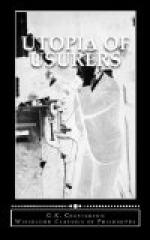I have never understood why it is that those who talk most about evolution, and talk it in the very age of fashionable evolutionism, do not see the one way in which evolution really does apply to our modern difficulty. There is, of course, an element of evolutionism in the universe; and I know no religion or philosophy that ever entirely ignored it. Evolution, popularly speaking, is that which happens to unconscious things. They grow unconsciously; or fade unconsciously; or rather, some parts of them grow and some parts of them fade; and at any given moment there is almost always some presence of thc fading thing, and some incompleteness in the growing one. Thus, if I went to sleep for a hundred years, like the Sleeping Beauty (I wish I could), I should grow a beard—unlike the Sleeping Beauty. And just as I should grow hair if I were asleep, I should grow grass if I were dead. Those whose religion it was that God was asleep were perpetually impressed and affected by the fact that he had a long beard. And those whose philosophy it is that the universe is dead from the beginning (being the grave of nobody in particular) think that is the way that grass can grow. In any case, these developments only occur with dead or dreaming things. What happens when everyone is asleep is called Evolution. What happens when everyone is awake is called Revolution.
There was once an honest man, whose name I never knew, but whose face I can almost see (it is framed in Victorian whiskers and fixed in a Victorian neck-cloth), who was balancing the achievements of France and England in civilisation and social efficiencies. And when he came to the religious aspect he said that there were more stone and brick churches used in France; but, on the other hand, there are more sects in England. Whether such a lively disintegration is a proof of vitality in any valuable sense I have always doubted. The sun may breed maggots in a dead dog; but it is essential for such a liberation of life that the dog should be unconscious or (to say the least of it) absent-minded. Broadly speaking, you may call the thing corruption, if you happen to like dogs. You may call it evolution, if you happen to like maggots. In either case, it is what happens to things if you leave them alone.
The Evolutionists’ Error
Now, the modern Evolutionists have made no real use of the idea of evolution, especially in the matter of social prediction. They always fall into what is (from their logical point of view) the error of supposing that evolution knows what it is doing. They predict the State of the future as a fruit rounded and polished. But the whole point of evolution (the only point there is in it) is that no State will ever be rounded and polished, because it will always contain some organs that outlived their use, and some that have not yet fully found theirs. If we wish to prophesy what will happen, we must imagine things now moderate grown enormous; things now local grown universal; things now promising grown triumphant; primroses bigger than sunflowers, and sparrows stalking about like flamingoes.




